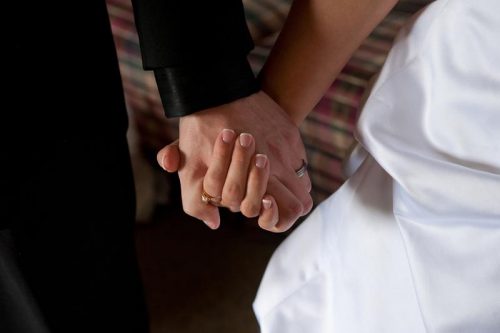Q. Thirty-five years ago, I met my husband and disobeyed my parents by pursuing a relationship with him. My parents are good people, and I at the time was a willful 17-year-old idiot. They told me that I could not receive Communion because I was in a state of sin and unrepentant.
So I left the church, and it has taken its toll. Now I would like to come back; my soul, I know, would be better off if I were going to church and receiving Communion. I am missing Christ very badly.

But the thing is this — I still don’t regret my love for my husband. He is a Southern Baptist and is very close to God in his own way. In order for me to return to the sacraments, do I have to leave him? He is a good man and doesn’t deserve that kind of betrayal. (City of origin withheld)
A. Thank you for writing — and the solution, it would seem, is fairly simple. I am assuming that you married your husband in an other-than-Catholic ceremony for which no permission had been granted by the Catholic Church. I am also assuming that your husband had never been married before (so that he does not need a Catholic annulment from a previous marriage).
You would by no means have to leave your husband now to return to the sacraments, nor should you. (Instead, you should thank God for bringing you into a union with a man who values his relationship with the Lord.)
What you need to do is to see your parish priest to arrange for a blessing (technically, a “convalidation”) for your marriage — and then you will be ready to return to the sacraments of penance and holy Communion.
Q. Please settle a dispute I am having with a colleague. Our society’s annual St. Patrick’s dinner is normally held on a Friday during Lent. We therefore request a dispensation in order to serve steak that evening.
I contend that all we must do is to request that dispensation from the pastor of the parish in which the restaurant is located; my colleague, though, says that we need to go to the bishop of our diocese and that only a bishop can grant it. Who is correct?
(I went to a Jesuit college, St. Peter’s; he went to a non-Jesuit school, Seton Hall, and I would love to prove him wrong. Of course, if he is right, I probably won’t tell him!) (central New Jersey)
A. Your question is a bit more complicated than you may have thought. The answer is that it depends on the diocese in which you are located. The church’s Code of Canon Law situates the authority with the bishop:
“A diocesan bishop, whenever he judges that it contributes to their spiritual good, is able to dispense the faithful from universal and particular disciplinary laws issued for his territory or his subjects by the supreme authority of the church” (No. 87).
A later canon clarifies that “a pastor and other presbyters or deacons are not able to dispense from universal and particular law unless this power has been expressly granted to them” (No. 89). That later canon does seem to suggest, though, that the power to dispense from abstinence may at times be extended by a bishop to his priests — and that is, in fact, both the law and the practice.
In 2017, when the feast of St. Patrick (March 17) occurred on a Friday, a statement from the Archdiocese of Detroit (to use just one example) said:
“All priests ministering in the archdiocese possess the faculty to dispense (remove) or commute (replace with something else) the obligation for an individual or family to abstain from meat on the Fridays of Lent. Therefore, those wanting to partake in a celebratory meal on St. Patrick’s Day that includes meat simply need to talk to a priest, who may grant this ‘for a just reason.'”
Generally, when a diocese on such an occasion lifts the obligation of abstinence, it stipulates that the person should choose some other penitential practice instead.
The Diocese of Dallas, for example, provided in 2017 that Catholics who chose to eat meat on March 17 should abstain either on March 16 or March 18. Creatively, the Dallas diocese offered still another option, viz., “for a person to offer a decade of the rosary for the plight of immigrants/refugees or for the intention of an increase in vocations to the priesthood.”
So the answer to your question depends on what your own diocese has provided for. (I recognize that my response does not resolve the Jesuit/non-Jesuit rivalry — because both of you could be right!)
Questions may be sent to Father Kenneth Doyle at askfatherdoyle@gmail.com and 30 Columbia Circle Dr., Albany, New York 12203.






















